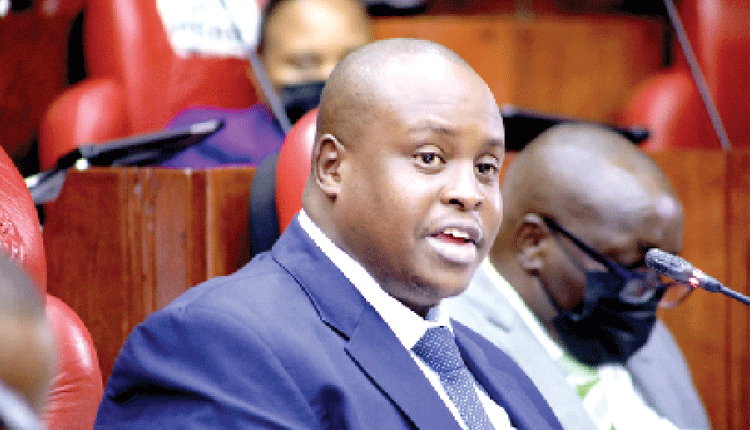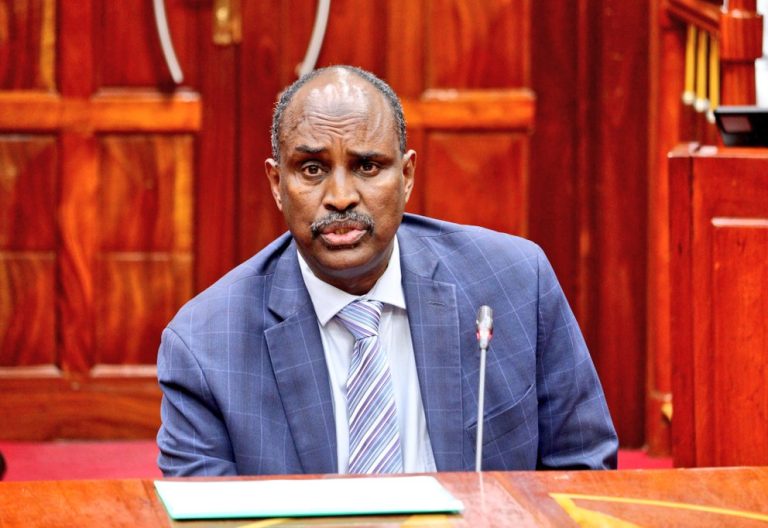EPRA CEO Daniel Kiptoo summoned by court over 16% VAT on fuel

The High Court on Monday ordered Energy Regulatory Authority CEO Daniel Kiptoo Bargoria to appear in court in person next month for disobeying court orders over the hiking of petroleum products prices.
Justices David Majanja, Christine Meoli and Lawrence Mugambi issued summons against EPRA Boss Kiptoo to avail himself in court on September 13, 2023, to explain why he should not be cited for contempt of court for disobeying the orders that suspended the implementation of the 16 per cent tax VAT on fuel products.
Omtata against EPRA
The orders were issued after Busia Senator Okiya Omtatah filed an application accusing EPRA of failure to comply with Justice Mugure Thande’s orders that barred the government from implementing the Finance Act 2023.
Omtatah told the judges that before the Court of Appeal Court lifted the orders barring the implementation of the Act on July 28, EPRA had already moved to effect new prices on the fuel products, which amounts to contempt of court.
According to Omtatah, he had served the court orders to Kiptoo through email and via WhatsApp, begging him not to effect the new fuel pump prices in line with the Finance Act 2023 which saw fuel VAT rise from 8% to 16% following Justice Mugure’s orders issued on June 30, 2023.
Omtata’s request
Omtatah now wants the court to send EPRA Managing Director Kiptoo to jail for a period of six months for continuing to disobey court orders issued by Justice Mugure.
“The Court be pleased to cite Daniel Kiptoo Bargoria, the Managing Director of the Energy and Petroleum Regulatory Authority (EPRA), for contempt of the valid orders the Court issued herein on June 30, 2023, which were duly and effectively served on him electronically on the same date and physically on Monday, July 3 2023, and consequently commit him to jail for such period not exceeding six months or such period of time as this Honourable Court may deem fit and/or proper as would be sufficient to punish the contemnor,” the Senator seeks.
During the mention of the finance cases, the three-judge bench also declined to suspend sections of the Finance Act including the housing levy as requested by the petitioners.
LSK request declined
The judges declined a plea by the Law Society of Kenya and Lawyer Robert Kamwara to suspend the housing levy pending the hearing and determination of the cases challenging the legality of the Finance Act 2023, saying they can not revoke the decision made by the Court of Appeal.
“We find that the Court of Appeal dealt with the issue of conservatory orders sought and we do not see any reason to depart from the directives issued,” Justice Majanja said.
The LSK through its President Eric Theuri had urged the Majanja-led bench to issue conservatory orders suspending the act despite the Court of Appeal ruling that allowed the National Treasury’s plan to raise more taxes to implement the Sh3.6 trillion budget.
While seeking the conservatory orders, Theuri stated that he is aggrieved by the state’s move to backdate the housing tax to July 1 saying employees and their employers should not be subjected to double pain because July salaries have already been paid.
According to the LSK President, the housing tax has an irreversible effect and workers will be lost in the event the law is found to be unconstitutional.
“We are seeking orders that housing tax cannot be implemented for the period there was a conservatory order suspending the implementation of the Finance Act,” Theuri said.
His request was also supported by Lawyer Kamwara who urged the court to suspend the implementation of section 84 of the Act since it would have an irreversible effect.
“It is irreversible because there is no enabling provision that KRA has in collecting these taxes and if the same is found unconstitutional later, we don’t know where to go to get a refund of the money and Kenyans will lose their money,” Kamwara told the judges.
He added that the KRA act in the first schedule clearly states that all taxes currently being collected by the authority following a notice issued on Friday last week including parking fees that Nairobi county was collecting, stamp duties amongst others are unconstitutional since in the schedule there is no enabling provision that allows them to collect the money.
At the same time, the three-judge bench also dismissed Omtatah’s application seeking to cross-examine National Assembly Speaker Moses Wetangula and his Senate counterpart Amason Kingi in relation to their affidavits claiming that there was a concurrence between the two houses before the law was passed
In his case, Omtatah questioned the constitutionality of the contested law, saying that the National Assembly passed the legislation without the Senate’s input.
In their affidavits, Wetang’ula and Kingi affirmed that there was concurrence. Omtatah, however, contested this position, arguing that the two speakers lied.
Immediately after his plea on cross-examination was rejected, Omtatah took on judges telling them that their ruling was against public interest.
“The ruling you have made is not in my favour is prejudicial to my case if those affidavits remain on record and authors can not be cross-examined on them. they have made averments which are totally false and constitute perjury on this court. they have manufactured documents and we want to put their feet to the fire ,” Omtatah told the bench.
“Please Omtatah, we have made a ruling,” Justice Majanja who is the presiding judge said.
But an angry Omtatah went on saying he be allowed to cross-examine the two speakers
He was however shut down by Majanja who insisted the court had made its ruling as regards that application.
The judges further consolidated all the ten petitions challenging enactment of the Finance Act,2023 which legalizes President William Ruto’s Sh3.6 trillion budget.
In the petitions that were consolidated by the three judges of the High Court, the main petitioner was Omtatah and Activist Eliud Matindi.
Others are Law Society of Kenya, lawyer kamwara, Azimio La Umoja Coalition, Peter Agoro, Dr Paul Saoke, Clement Onyango, and the Association of Alcoholic Beverages. The petitions were filed separately after Ruto assented to the bill.
The judges fixed the cases to be heard on September 13 and 14,2023.








